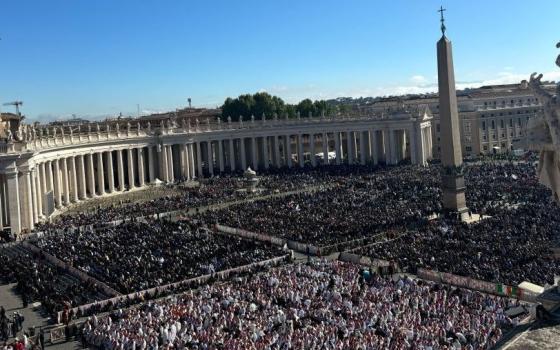If you think that hearing another part of the Christmas story as late as Jan. 8 is stretching it out too much, just imagine what those Magi felt as they trudged through the desert toward Jerusalem and then on to Bethlehem. Their trek probably lasted even longer than the commercial Christmas season. Matthew then took their story and fashioned it as a subtle summary of the entire Gospel message. All we have to do is decode it a little.
| The Epiphany of the Lord |
| Isaiah 60:1-6 Psalm 72 Ephesians 3:2-3a Matthew 2:1-12 |
First, while Matthew explains that Jesus came from good Jewish stock, he makes it equally clear that God isn't into racial purity. Besides Mary, there are four women mentioned in Jesus' genealogy, each of them a foreigner; collaboration with God's plan was not limited by the bloodlines of the chosen people. In fact, Joseph's acceptance of the pregnant Mary and Herod's use of Scripture to further his plan to harm the infant Jesus demonstrate that scrupulous adherence to law and belief in messianic prophecies don't necessarily prove faithfulness to God. Now we see that in Matthew's Gospel the first people to give homage to Jesus were probably Arabs, "pagans" who learned from nature rather than Scripture that God was up to something in their day.
These pilgrims fit the description of "God fearers." They were people looking for more, who believed in signs indicating that God was involved in human history. They were also ready to go a distance to see.
The Magi followed a star, a sign in their own tradition, but they didn't limit themselves to their own religious background. upon arriving to Jerusalem, they sought counsel from the faith of the people of that place. When "they sought diligently," Jewish wisdom together with their own tradition led them to the child. Matthew records no commentary about the family's modest setting, but only says that they saw the child and prostrated themselves in homage. Then, adding practical content to their religious sentiment, they "opened their treasures" and gave him gifts of gold, frankincense and myrrh. We might say they worshiped in word and deed.
We picture them as three because of the three gifts that are named. In reality, they could have been two or 10 or more; they could have been a retinue including women and children. But what's important about them is what they have to tell us about seeking and finding, about worship that has integrity.
Without mentioning the Magi, St. Augustine reflected on how human nature was created with a thirst for the divine: "Our hearts are restless until they rest in thee." The Magi were people gifted with what Augustine might have called the grace of holy restlessness. Apparently well-to-do enough to take a long journey and arrive with expensive gifts, they set off with enough interior freedom to be responsive to the Spirit who urged them to look for more than they already had and knew.
We use the story of the Magi's seeking and finding as the frame for our feast of the Epiphany, the celebration of God's self-revelation. The combination of this story and the meaning of the feast make a subtle theological statement intimating that only those who are willing to go a distance in their seeking will discover God's self-manifestation. We might look to e.e. cummings for light on the mystery of the Epiphany journey. In his poem "somewhere i have never travelled," he writes:
somewhere i have never
travelled, gladly beyond
any experience, your eyes
have their silence:
in your most frail gesture are
things which enclose me,
or which i cannot touch
because they are too near
That's an ode to the beloved. At the same time, perhaps unintentionally, cummings' poetry suggests an insight into what it meant to gaze on the Christ Child; it's meditation on the dance between humans and the God who lures us to share divine life. When the Magi encountered the babe, they had indeed traveled beyond any experience and found great power in frailty.
The journey of the Magi is a reminder that the pilgrimage toward God is long. As the Magi seeking a king found a poor child, our journey will surprise us as well. In telling of the Magi, strangers to the traditions of Israel, Matthew intended to shake us out of our ethnocentrism and facile assumptions about other people's beliefs and our own as well.
The story of the star leading to Bethlehem's child is one more rendition of God's gentle yet unrelenting overtures to humanity. In the effort to draw us close, God will use anything from stars and prophecies to poetry or restlessness. If we are open to the grace of seeing, anything and everything can be an epiphany.
[Mary M. McGlone, a Sister of St. Joseph of Carondelet, is currently writing the history of the Sisters of St. Joseph in the U.S.]




